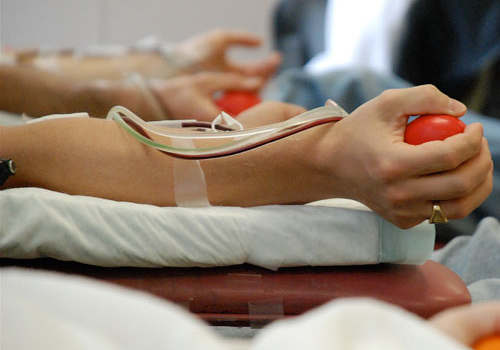
The American Red Cross always needs blood and platelet donations to help save lives. (Photo by American Red Cross)
This January, the American Red Cross is celebrating National Blood Donor Month, recognizing the lifesaving contribution blood and platelet donors make to modern healthcare. As 2015 gets underway, the Red Cross offers tips for a successful donation experience.
Before your donation:
- Maintain a healthy iron level in your diet by eating iron-rich foods, such as red meat, fish, poultry, beans, spinach, iron-fortified cereals and raisins.
- Get a good night’s sleep.
- Drink an extra 16 oz. of water or nonalcoholic fluids before the donation.
- Eat a healthy meal and avoid fatty foods before your donation.
- If you are a platelet donor, remember that your system must be free of aspirin for two days prior to donation.
- Remember to bring your donor card, driver’s license or two other forms of ID.
During your donation:
- Wear clothing with sleeves that can be raised above the elbow.
- Let the person taking your blood know if you have a preferred arm and show them any good veins that have been used successfully in the past to draw blood.
- Relax, listen to music, talk to other donors or read during the donation process.
- Take the time to enjoy a snack and a drink in the refreshments area immediately after donating.
After your donation:
- Drink an extra four (8-ounce) glasses of liquids and avoid alcohol over the next 24 hours.
- Remove the wrap bandage (if you had one put on your arm) within the next hour.
- Keep the strip bandage on for the next several hours.
- To avoid a skin rash, clean the area around the strip bandage with soap and water.
- Do not do any heavy lifting or vigorous exercise for the rest of the day.
- If the needle site starts to bleed, apply pressure to it and raise your arm straight up for about 5-10 minutes, or until bleeding stops.
- If you experience dizziness or lightheadedness after donation, stop what you are doing and sit down or lie down until you feel better. Avoid performing any activity where fainting may lead to injury for at least 24 hours.
Blood can be safely donated every 56 days. Platelets can be given every seven days up to 24 times a year. Individuals who are 17 years of age (16 with parental consent in most states), weigh at least 110 pounds and are in generally good health may be eligible to donate blood. High school students and other donors 18 years of age and younger also have to meet certain height and weight requirements.
For more information or to schedule an appointment to donate, call 1-800-RED CROSS (1-800-733-2767) or visit redcrossblood.org. Donors can also use the Red Cross blood donor app, which is free and available for download now. It can be found in app stores by searching for American Red Cross.







Leave a Reply